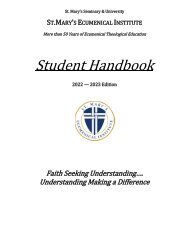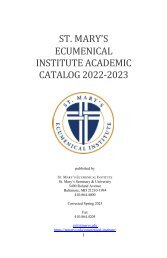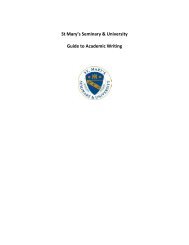School of Theology Catalog 2021
St. Mary's Seminary & University academic catalog for the School of Theology for the 2021-2022 academic year.
St. Mary's Seminary & University academic catalog for the School of Theology for the 2021-2022 academic year.
Create successful ePaper yourself
Turn your PDF publications into a flip-book with our unique Google optimized e-Paper software.
Anthropology and Theological<br />
Ethics in the <strong>Theology</strong> curriculum.<br />
PHIL204Metaphysics<br />
3 credits. Metaphysics is the science<br />
<strong>of</strong> being qua being, it is the<br />
attempt to posit an act by an act,<br />
to judge rightly concerning existence,<br />
and to develop and promote<br />
wisdom in ourselves so that<br />
we may rightly order all things<br />
and teach others to do likewise.<br />
This course is designed to provide<br />
students with some <strong>of</strong> the foundational<br />
philosophical tools they will<br />
need in order to begin the lifelong<br />
process <strong>of</strong> acquiring the<br />
habit <strong>of</strong> wisdom by investigating<br />
the ultimate cause(s) <strong>of</strong> being.<br />
PHIL205Philosophical Ethics<br />
3 credits. This course treats general<br />
principles <strong>of</strong> ethical decisionmaking<br />
and moral action. It considers<br />
topics such as conscience,<br />
natural law, freedom, responsibility,<br />
virtue and vice. It treats the<br />
notions <strong>of</strong> the common good, solidarity,<br />
and subsidiarity which are<br />
central to Catholic social ethics.<br />
Students also will be introduced<br />
to influential ethical theories such<br />
as utilitarianism, deontology, and<br />
emotivism. The moral thought <strong>of</strong><br />
St. Thomas Aquinas is emphasized.<br />
PHIL301Ancient and Medieval<br />
Philosophy<br />
3 credits. The first course in the<br />
historical sequence, this course<br />
considers the emergence and<br />
early development <strong>of</strong> philosophy<br />
among the Greeks; Socrates,<br />
Plato, and Platonism; Aristotle’s<br />
philosophical achievement; the<br />
Church Father’s engagement<br />
with Hellenistic thought; scholasticism;<br />
and culminates with St.<br />
Thomas Aquinas’s synthesis <strong>of</strong><br />
faith and philosophy in “sacra<br />
doctrina.” Key concepts <strong>of</strong> the<br />
course include nature, cosmos,<br />
logos, form, cause, science, wisdom,<br />
prudence, virtue, creation,<br />
and the disciplinary terms “philosophy”<br />
and “theology” themselves.<br />
PHIL302 Modern Philosophy<br />
3 credits. A continuation <strong>of</strong> the<br />
study <strong>of</strong> western philosophical<br />
thought begun in PHIL301, this<br />
course introduces students to<br />
the new conceptions <strong>of</strong> nature<br />
and natural philosophy authored<br />
by Francis Bacon and René<br />
Descartes; the new articulations<br />
<strong>of</strong> the human person put forth by<br />
Machiavelli, Thomas Hobbes,<br />
and John Locke; and the reactions<br />
to these predecessors by<br />
Jean-Jacques Rousseau,<br />
Immanuel Kant, G. W. F. Hegel,<br />
Karl Marx, and Friedrich<br />
Nietzsche. Key concepts for the<br />
course include the state <strong>of</strong> nature,<br />
the state, rights, compassion,<br />
autonomy, values, and History.<br />
Sustained comparison and contrast<br />
with premodern concepts<br />
during the course is intended to<br />
develop the student’s historical<br />
and systematic understanding.<br />
PHIL305Epistemology<br />
3 credits. Epistemology investigates<br />
the nature <strong>of</strong> human knowing.<br />
It attempts to answer the<br />
questions: (1) What are we doing<br />
when we know? (2) Why is doing<br />
that knowing? So that it can<br />
explain what constitutes human<br />
knowing through an empirically<br />
grounded analysis <strong>of</strong> what we are<br />
actually doing when we know and<br />
a critical extrapolation <strong>of</strong> why<br />
such a process yields a correspondence<br />
with reality, that is, why<br />
50







